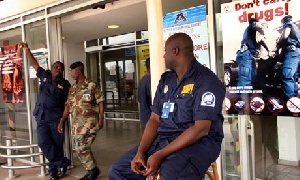Ghana’s main entry port, the Kotoka International Airport, has been hit with a series of arrests relating to the multi-million dollar cocaine trade, compelling security agencies to go into overdrive as a number of suspects have been arrested.
The airport has become the hub of drug trafficking in recent times, apparently with tacit official cover up, as drug law enforcement agents facilitate safe passage for drug couriers to ply their trade outside.
According to information gathered, operation agents of the National Drug Control Board (NACOB) have arrested 15 of their own personnel including National Security and Bureau of National Investigations (BNI) operatives, over drug-related offences within the last couple of weeks at Kotoka International Airport.
Daily Guide has gathered that the suspects allegedly connived with suspected drug peddlers at the Kotoka International Airport duty post so that the couriers could export the substances.
According to sources, a drug suspect, who travelled from Kotoka, was arrested at his final destination in an overseas country and mentioned the names of the security operatives at KIA as those who facilitated his concealment of the cocaine in the plane, leading to his safe departure from Ghana.
Jerry, Fati, Akufo, Emmanuel, Timothy, Dennis and Mubarak (full names withheld for security reasons) are among suspected staff of NACOB, BNI and National Security being investigated over the trafficking of narcotic substances.
The drug enforcement agents were said to have been recruited by government in its fight against narcotic drugs.
The suspects are being held in the cells of BNI on behalf of NACOB since, according to a source, keeping them in their own facilities was not an appropriate thing to do under the circumstances.
Some airport personnel working for the various state agencies easily fall prey to the temptation presented by drug peddlers who dangle thousands of dollars in front of them until they yield.
One of the suspects was earlier temporarily released following some discrepancies but when he honoured the order that he report to the BNI, he was detained once more.
There have been behind-the-scene manouvres to prevent the case from being taken to court or getting into the media eye.
The manouvres have reportedly been declined, a big blow to the suspects who, by the development, are set to make appearances before a court of law soon.
NACOB, Daily Guide has learnt, is seeking to make a point about the agency’s resolve not to countenance the illicit business in the country against the recent flak it suffered when its head, Yaw Akrasi Sarpong made some remarks about drugs in the media.
There has been a heightened anti-drug operation by relevant state agencies in the past few weeks in response to an influx of the narcotic substances into the country through the country’s main entry port.
In one instance, a passenger travelling aboard Air Maroc, the Moroccan carrier, to Casablanca en route to New York, was arrested for carrying substances suspected to be cocaine early Saturday morning at the point of departure.
He was immediately handcuffed and whisked away.
Another drug suspect, Catherine Oduro, was allegedly arrested on board a KLM flight to the United States via Amsterdam with suspected cocaine worth 18kilos.
The next day after this arrest, Akrasi Sarpong raised the political temperature of the country when he went on air with allegations that some political personalities were into the drug trade.
Cocaine in the past years has become a political issue in the country as it is used by politicians to run down their opponents even when there is no basis for such attacks.
Ghana is used by couriers to move the stuff to other parts of the world sourcing the stuff from Latin America and countries close to Asia.
Narcotic substances include cocaine, heroin, crack and marijuana. While the first three are sniffed, the latter is smoked as cigarette. Their hallucinating effect is addictive and the continued dependence on it can lead to devastating psychiatric challenges. The US and other countries have invested millions of dollars in the fight against drugs in countries such as Afghanistan to have farmers of poppy, the source of cocaine, change over to other farm produce.
General News of Tuesday, 23 August 2011
Source: Daily Guide

















